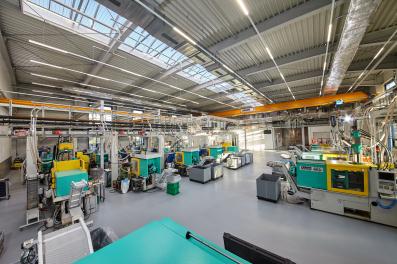We use more than 50 injection moulding machines from Arburg and Engel at our Erkrath and Pforzheim locations in Germany to produce highly sophisticated plastic parts and optical components in single and two-component technology. Thanks to modern production facilities, fully automatic handling and packaging systems and automated processes, we can meet our customers’ exacting requirements in terms of quality, cost-effectiveness and timeliness. Our portfolio ranges from the smallest component size weighing just a few milligrams to light guides that are up to approx. one metre in length – made with the required high surface quality and the lowest tolerances every time.

Manufacturing high-quality optical precision components using injection moulding requires extensive experience and highly specialist know-how. Consistent, reproducible quality relies on many different quality variables being taken into consideration and coordinated precisely, from tool construction and material selection, to the injection itself, to extraction through a handling system, for example. The optical characteristics required in the use of our products place particular demands on the materials used, which go way beyond the usual requirements in non-optical applications.
Special granules and compounds are required that are frequently developed jointly with material suppliers specifically for our customers’ particular applications. When the plastic granules are processed, the production parameters in the injection moulding process, such as the time, temperature or pressure, have a significant influence on the optical characteristics of the finished components. If these parameters are not balanced optimally, it may result – for example, in the case of longer light guides – in undesirable absorption behaviour causing changes to the light colour (colour shift). The injected material absorbs light of a particular wavelength, so the visible light colour changes unintentionally across the length of the light guide.

To guarantee that all factors affecting quality are managed and coordinated throughout the development and production process, we have set up a role dedicated to optimising the entire injection moulding process. This employee is involved in the whole process chain, from the tool construction phase to initial sampling, all the way through to series production, and ensures that quality is maintained on budget and on schedule. For more information on plastic injection moulding and its applications, visit the Lighting solutions section.
Expansion of our technology portfolio
The fundamental technical conditions and specific requirements of customer projects are as varied as the projects themselves. And they are becoming increasingly complex. To satisfy them, as well as to create new opportunities to integrate light usefully into products, we are continually developing our technology portfolio. In addition to our fundamental plastic injection moulding technology, we also use other manufacturing methods depending on the requirements of the customer’s application: for example, the M-Cut 2D light guide system, M-Fibre side light fibre technology and textile lighting systems: